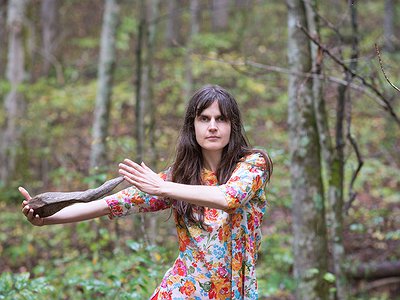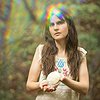Could you describe your creative process on the basis of a piece or album that's particularly dear to you, please? Where did the ideas come from, how were they transformed in your mind, what did you start with and how do you refine these beginnings into the finished work of art?
The process for making Deeper Woods was totally different from Nightttime Birds and Morning Stars. The latter came in this amazing burst and Deeper Woods took years to complete and let go of. Deeper Woods began as a series of solo 12-string guitar pieces and a capella songs that I wrote while working as a landscaper. It took a while to figure out how to combine the two. I also knew that I wanted to create multi-tracked arrangements, which involved the hurdle of learning how to record myself and learning new instruments like recorder and keyboard. But at the end I knew how to do all of these new things, which will continue to inspire anything I make.
There are many descriptions of the ideal state of mind for being creative. What is it like for you? What supports this ideal state of mind and what are distractions? Are there strategies to enter into this state more easily?
I think the ideal state of mind involves being kind to yourself. Can you still love yourself if you don’t have a productive day or try something knowing that it might not work? You continually have to step into the unknown while creating, which requires holding yourself with care. I have found meditation and mindfulness to be hugely important here. Without these tools negative thoughts can pass through unnoticed but not unfelt. I’m very interested now in emptying my mind so that I can be receptive to what comes from my higher self/the universe. Distractions are the many forms of admin necessary to be a musician, especially social media. I am careful to use it as a tool and set firm boundaries, because it is designed to rewire your brain in a way that creates the most profit for the corporations that run them - and the most distractions/bad feelings for its users.
How is playing live and writing music in the studio connected? What do you achieve and draw from each experience personally? How do you see the relationship between improvisation and composition in this regard?
Figuring out how to perform Nighttime Birds and Morning Stars has been a huge challenge, but I knew from the beginning that I wanted that process to feed my creative practice rather than become a rigid process of replication. I wanted to use hardware (and of course my guitar!) rather than a laptop, so it’s required learning new instruments like an SP-404 and 0-Coast. I’m really excited to see where it leads me, because already I can tell these new tools will influence my future work. I’ve had the fantasy of jamming with myself for a while now (I love jamming with other people too!) and this is my ticket. It’s going to be a fun year!
How do you see the relationship between the 'sound' aspects of music and the 'composition' aspects? How do you work with sound and timbre to meet certain production ideas and in which way can certain sounds already take on compositional qualities?
My new album is very much about timbre. I think of timbre in the same way as I think about any other element in a song - as a way to communicate feeling, sustain interest and carry it forward. Different timbres have different connotations, which adds poetic dimension to music.
Our sense of hearing shares intriguing connections to other senses. From your experience, what are some of the most inspiring overlaps between different senses - and what do they tell us about the way our senses work? What happens to sound at its outermost borders?
By delivering images and feelings through direct revelation, music gives listeners a means of exploring inner and outer worlds in an ancient, pre-lingual way. The mind takes music and in a flash can transport the listener to new worlds or help them process grief or feel more joyfully embodied or solve a problem or connect with the collective unconscious... These near-magical abilities are what make us human and what makes music so human. And it’s why we need music now more than ever.
Art can be a purpose in its own right, but it can also directly feed back into everyday life, take on a social and political role and lead to more engagement. Can you describe your approach to art and being an artist?
My music is a means to share my relationship with the earth with others. There is a political dimension to that but also a spiritual one. I am often thinking about how I can use my status as a musician to do good in the world. There are so many possibilities - from doing fundraisers to raising awareness to helping someone through a hard time. Collectively we have a lot of power. The music I make is tied to my life. Art and life have always been bound together. So I practice compassion towards myself and others and cook good meals and keep my floor swept and my dog happy. If all of that is taken care of the rest will come naturally.
It is remarkable, in a way, that we have arrived in the 21st century with the basic concept of music still intact. Do you have a vision of music, an idea of what music could be beyond its current form?
If it ain’t broke don’t fix it! But I do think we’ll start seeing music incorporated in immersive environments as emerging technology enters the mainstream. Things could get pretty psychedelic.



